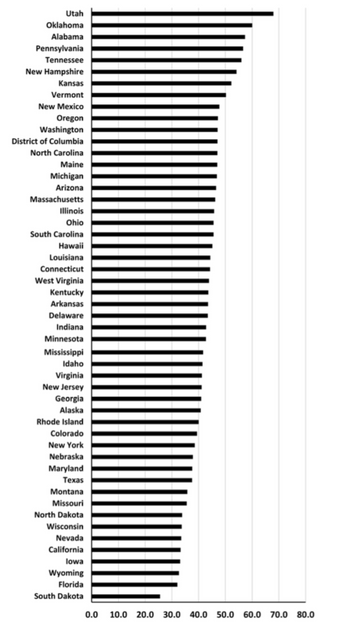State Alcohol Laws Focus on Drunk Driving—They Could Do Much More.
 US state laws to reduce impaired driving have substantially increased in number and strength over the last 20 years, but laws to reduce excessive drinking remained unchanged, according to a new School of Public Health study.
US state laws to reduce impaired driving have substantially increased in number and strength over the last 20 years, but laws to reduce excessive drinking remained unchanged, according to a new School of Public Health study.
The study, published in the Journal of Studies on Alcohol and Drugs, scores each state on a scale from 0 to 100, with 100 representing the most effective possible set of alcohol control laws. South Dakota scores the lowest at 25, but the highest scorer, Utah, only comes in at 68.
“There is substantial room for reasonable improvement in every state,” says study lead author Jason Blanchette, a postdoctoral associate in health law, policy & management.
“Approximately 85 percent of alcohol-related death is attributable to causes other than impaired driving,” Blanchette notes, according to the Centers for Disease Control and Prevention (CDC). Other major causes include unintentional injuries, violence, liver disease, stroke, hypertension, and several types of cancer. All together, excessive alcohol consumption is the third leading preventable cause of death in the US, responsible for approximately 88,000 deaths annually.
“Laws that reduce excessive drinking also have an independent effect of reducing impaired driving,” Blanchette notes.

The researchers developed the Alcohol Policy Scale (APS) in 2014, consulting with experts who nominated and rated the efficacy of 29 state-level alcohol policies with enough consistent data for study. For the new study, Blanchette and colleagues updated the APS and assigned scores to each state and the District of Columbia from 1999 to 2018.
They found that 23 states and D.C. improved their rankings in this period (most notably Arizona, Nevada, and D.C., as well as Utah), while scores for 18 states worsened (most notably Delaware, Georgia, and Virginia).
In their paper, the researchers provide examples for how Utah could strengthen its alcohol policy environment, including increasing its beer tax and its state-owned liquor store prices, and increasing the number of police officers assigned to alcohol enforcement.
The study was co-authored by Timothy Heeren, professor of biostatistics and epidemiology; Timothy Naimi, professor of community health sciences; and Marlene C. Lira of the Clinical Addiction Research and Education (CARE) Unit at Boston Medical Center.